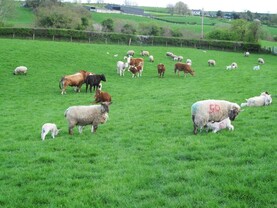Knackeries have resumed full operations this week following a five-day strike in which all fallen animal collection and delivery services were halted.
The Animal Collectors Association (ACA) held an emergency meeting with the Department of Agriculture on Monday after which its members decided to resume services across the country.
Both the ACA and the Department have remained tight-lipped about the outcome of the meeting. The fallen animal scheme has been revised and knackeries will now receive support from the Department for the collection and disposal of cattle under 48 months and sheep.
The previous scheme only supported animals over 48 months that were subject to BSE testing requirements and the details of the new supports have not been published.
However, concerns have been raised that the maximum collection fees that knackeries can charge, set as part of the scheme, exposes farmers to higher disposal costs.
Based on Irish Farmers Journal analysis of the limits set and the number of fallen animals per year, farmers could pay up to €13m annually in collection fees.
IFA animal health chair Pat Farrell said it was critical that maximum fees were not interpreted as the going rate for collections.
He said farmers should demand a reduction in fees to take into account the direct financial support the Department was now providing to knackeries.
Farrell said the current disposal system was clearly not the most cost-efficient as rendering charges for calves were €4, while farmers could be charged up to €30 by knackeries.
ICMSA deputy president Lorcan McCabe stressed that the bill for the resolution of the dispute must not be presented to farmers.
“We’re vehemently opposed to any idea that where two non-farmer elements disagree that they compromise by agreeing that the increased cost should be passed on to the farmers,” McCabe said.
Read more
Rendering costs and knackery collection fees ‘grossly out of line’
Knackery dispute costs must not be passed to farmers – ICMSA
Knackeries have resumed full operations this week following a five-day strike in which all fallen animal collection and delivery services were halted.
The Animal Collectors Association (ACA) held an emergency meeting with the Department of Agriculture on Monday after which its members decided to resume services across the country.
Both the ACA and the Department have remained tight-lipped about the outcome of the meeting. The fallen animal scheme has been revised and knackeries will now receive support from the Department for the collection and disposal of cattle under 48 months and sheep.
The previous scheme only supported animals over 48 months that were subject to BSE testing requirements and the details of the new supports have not been published.
However, concerns have been raised that the maximum collection fees that knackeries can charge, set as part of the scheme, exposes farmers to higher disposal costs.
Based on Irish Farmers Journal analysis of the limits set and the number of fallen animals per year, farmers could pay up to €13m annually in collection fees.
IFA animal health chair Pat Farrell said it was critical that maximum fees were not interpreted as the going rate for collections.
He said farmers should demand a reduction in fees to take into account the direct financial support the Department was now providing to knackeries.
Farrell said the current disposal system was clearly not the most cost-efficient as rendering charges for calves were €4, while farmers could be charged up to €30 by knackeries.
ICMSA deputy president Lorcan McCabe stressed that the bill for the resolution of the dispute must not be presented to farmers.
“We’re vehemently opposed to any idea that where two non-farmer elements disagree that they compromise by agreeing that the increased cost should be passed on to the farmers,” McCabe said.
Read more
Rendering costs and knackery collection fees ‘grossly out of line’
Knackery dispute costs must not be passed to farmers – ICMSA






 This is a subscriber-only article
This is a subscriber-only article









SHARING OPTIONS: